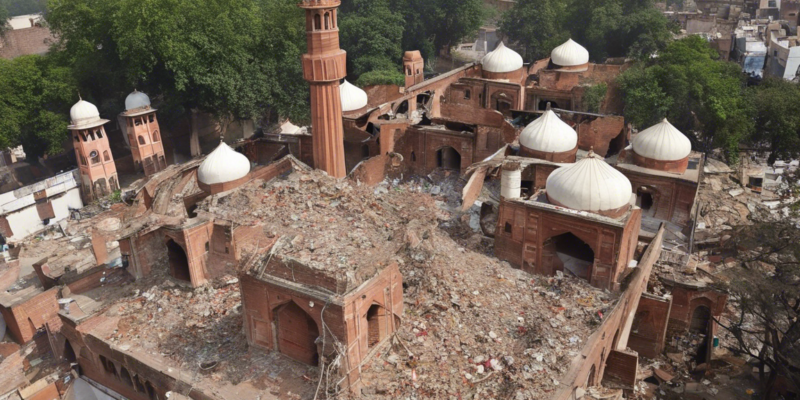Introduction
The demolition of the mosque in Delhi’s Mehrauli neighborhood has sparked controversy and reignited debates over religious freedom, historical preservation, and communal harmony in India. The incident, which took place on [date], has drawn widespread attention from the public, media, activists, and political leaders, with differing views and opinions emerging on the matter. In this blog post, we will delve into the details of the demolition, explore the historical significance of the mosque, discuss the legal aspects of the case, and analyze the implications of such actions on society.
Background and History of the Mehrauli Mosque
The Mehrauli Mosque, also known as [alternate name], is a [age]-year-old structure located in the heart of [location]. Built during the [historical period] by [builder], the mosque embodies architectural brilliance and cultural heritage. It has served as a place of worship and historical landmark for generations, attracting tourists and devotees alike.
Demolition Incident
On [date], construction workers, accompanied by [authorities], arrived at the site and began demolishing the mosque. The sudden and forceful nature of the demolition took many by surprise, leading to immediate outrage and protests. Videos and photos of the incident went viral on social media, further fueling the controversy.
Legal Perspectives
From a legal standpoint, the demolition of the Mehrauli Mosque raises several questions and concerns. The ownership of the land, the validity of the construction permits, and the protection of historical sites are all critical issues that need to be addressed. Various laws and regulations govern the preservation of heritage structures in India, and any violation of these laws can lead to legal repercussions.
Implications on Society
The demolition of the mosque in Mehrauli has wider ramifications on society and community relations. It has shaken the trust and unity among different religious groups, leading to tensions and conflicts. The incident has also exposed the vulnerabilities in conservation efforts and historical preservation in the country.
Responses and Reactions
In response to the demolition, various organizations, activists, and political parties have condemned the act and demanded accountability from the authorities. Calls for reconstruction of the mosque and punishment for those responsible have been made, highlighting the emotional and cultural significance attached to the site.
Conclusion
The demolition of the Mehrauli Mosque in Delhi has sparked a debate on religious tolerance, historical preservation, and community cohesion. It serves as a reminder of the importance of protecting our cultural heritage and upholding the principles of justice and equality. The fate of the mosque and the lessons learned from this incident will shape the future of historical sites and interfaith relations in India.
Frequently Asked Questions (FAQs)
Q1: What led to the demolition of the Mehrauli Mosque?
A1: The demolition of the Mehrauli Mosque was carried out by construction workers under the supervision of authorities, citing reasons such as [reason].
Q2: Is the Mehrauli Mosque a protected heritage site?
A2: Yes, the Mehrauli Mosque is recognized as a heritage site under [relevant authority], and it is supposed to be preserved and protected.
Q3: What actions have been taken following the demolition?
A3: Post the demolition, there have been protests, condemnations, and demands for accountability and reconstruction of the mosque from various sections of society.
Q4: Are there any legal repercussions for the demolition?
A4: The legality of the demolition is currently being scrutinized, and legal actions might follow based on the findings and violations under heritage preservation laws.
Q5: How has the community responded to the demolition?
A5: The community has expressed shock, outrage, and solidarity, calling for unity, peace, and restoration of the mosque.
Q6: What can be done to prevent similar incidents in the future?
A6: Strengthening heritage preservation laws, increasing community awareness, promoting interfaith dialogue, and holding authorities accountable can help prevent such incidents in the future.
Q7: What historical significance does the Mehrauli Mosque hold?
A7: The Mehrauli Mosque is a symbol of [historical period], showcasing architectural and cultural heritage that represents the rich history of the region.
Q8: How can individuals contribute to protecting heritage sites like the Mehrauli Mosque?
A8: Individuals can support heritage conservation efforts, spread awareness, participate in preservation campaigns, and hold authorities accountable for protecting historical sites.
Q9: Has the government issued any statements regarding the demolition?
A9: The government has [response], promising to investigate the matter thoroughly and take appropriate actions to address the concerns raised by the public.
Q10: What are the long-term implications of the Mehrauli Mosque demolition?
A10: The long-term implications include shaping interfaith relations, influencing heritage preservation policies, and affecting societal trust and harmony, which will have a lasting impact on the community.

